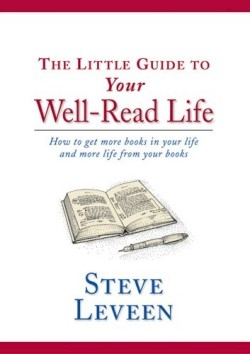The Little Guide to Your Well-Read Life
How to Get More Books in Your Life and More Life from Your Books
The Italian author, Italo Calvino (best known for his fantastical storytelling, particularly in The Castle of Crossed Destinies, a retelling of the Decameron), believed that half the books in one’s library should be books one has not read and that there should be empty shelves left for surprises. Arguing that books have the ability to nourish souls, Calvino urged readers to open up space for the places a good story can take the reader.
His attitude resonated with the author of this book. Because Leveen was unable to “get through” some important classics and because he understood the “sweetness of book enlightenment,” he found himself thinking about “missed opportunities in reading.” Like most students, he disliked some of what was included on “to read” lists in school. Even though he thought himself “not much of a reader,” Leveen and his wife Lori founded Levenger, a company for providing “tools for serious readers.” He heard customers complain that what they “wanted most was more time to read.” As a merchant, he felt a “deep desire” to help his customers.
The Little Guide to <U>Your<u> Well-Read Life is taken from Leveen’s discussions with customers, interviews with serious readers, and his own reading. While researching the book, Leveen discovered that “bookish people are not stereotypes.” This audio version is read by the author with no fanfare or distractions, in a conversational tone, and the audio quality is excellent. Leveen’s reading offers a straightforward and well-organized listing of the ideas he hopes to convey.
Amongst the suggestions offered are making a list of books one really wants to read. By writing down where the reader first heard about a book—from a friend, from a book group, from watching a movie, or from reading a review—the reader is more likely to learn whose suggestions are most suited to his or her temperament. Leveen also urges readers to make a list of books (“a book biography”) they’ve already read.
The author suggests organizing books by personal taste—books for advancing one’s career, books for traveling (what he calls “when-I-go-there” reading), and books that are of personal importance.
To his credit, Leveen understands that not every book is a perfect match for every reader, that some classics do not offer a universal appeal, and that there’s no reason to continue reading a book if it doesn’t offer pleasure. Following Calvino’s lead, Leveen urges readers to find nourishing books and not to waste precious reading time on books that aren’t of interest. The Little Guide to <U>Your<u> Well-Read Life offers both anecdotal and practical solutions for readers and may help librarians and booksellers in their long-range planning.
Reviewed by
Pam Kingsbury
Disclosure: This article is not an endorsement, but a review. The publisher of this book provided free copies of the book to have their book reviewed by a professional reviewer. No fee was paid by the publisher for this review. Foreword Reviews only recommends books that we love. Foreword Magazine, Inc. is disclosing this in accordance with the Federal Trade Commission’s 16 CFR, Part 255.

